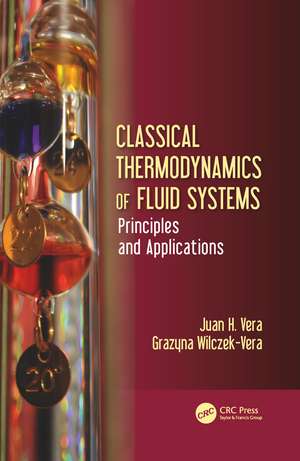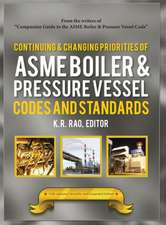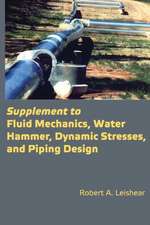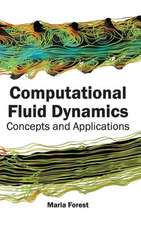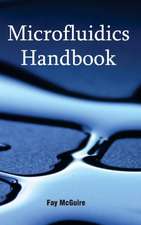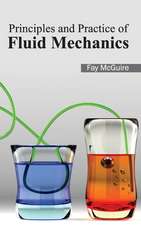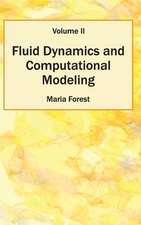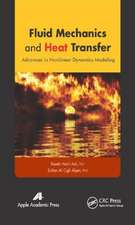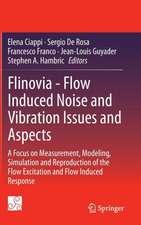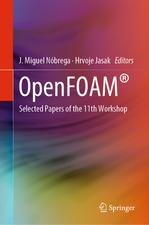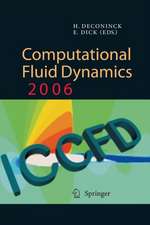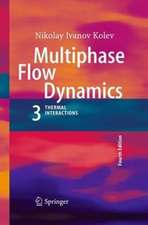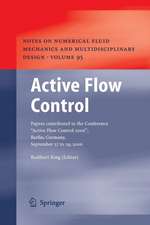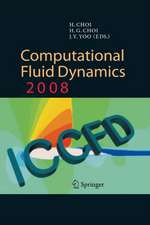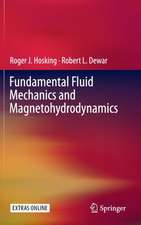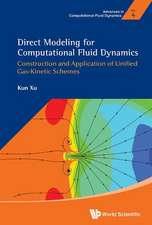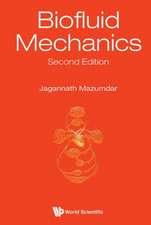Classical Thermodynamics of Fluid Systems: Principles and Applications
Autor Juan H. Vera, Grazyna Wilczek-Veraen Limba Engleză Paperback – 31 mar 2021
| Toate formatele și edițiile | Preț | Express |
|---|---|---|
| Paperback (1) | 443.88 lei 6-8 săpt. | |
| CRC Press – 31 mar 2021 | 443.88 lei 6-8 săpt. | |
| Hardback (1) | 1229.92 lei 6-8 săpt. | |
| CRC Press – 18 noi 2016 | 1229.92 lei 6-8 săpt. |
Preț: 443.88 lei
Nou
Puncte Express: 666
Preț estimativ în valută:
84.95€ • 87.76$ • 70.70£
84.95€ • 87.76$ • 70.70£
Carte tipărită la comandă
Livrare economică 25 martie-08 aprilie
Preluare comenzi: 021 569.72.76
Specificații
ISBN-13: 9780367782580
ISBN-10: 0367782588
Pagini: 456
Dimensiuni: 156 x 234 x 23 mm
Greutate: 0.64 kg
Ediția:1
Editura: CRC Press
Colecția CRC Press
ISBN-10: 0367782588
Pagini: 456
Dimensiuni: 156 x 234 x 23 mm
Greutate: 0.64 kg
Ediția:1
Editura: CRC Press
Colecția CRC Press
Cuprins
Part I: Fundamentals. Basic Concepts and Definitions. The First and Second Laws of Thermodynamics. The Concept of Entropy. Conservation of Energy in an Open Flow System. Definition of Enthalpy. The Algebra of State Functions. The Helmholtz and Gibbs Functions. Calculation of Changes in the Value of Thermodynamic Properties. Part II: Mixtures. Partial Molar Properties and Property Changes by Mixing. The Chemical Potential and the Gibbs-Helmholtz Equation. The Principles of Physical and Chemical Equilibrium. The Phase Rule and Duhem Theorem. Generality of the Thermodynamic Treatment. The Ideal Gas and Ideal Gas Mixtures. The Use of Fugacity and Activity in Equilibrium Studies. Calculation of Fugacities from Equations of State (EOS). Fugacity of a Mixture and of Its Components. Fugacities and Activities in Liquid Mixtures of Non Electrolytes. Activity Coefficients and Excess Properties. Mixture Behavior, Stability and Azeotropy. The Thermodynamics of Aqueous Electrolyte Solutions. Part III: Applications. The Thermodynamics of Chemical Reactions. The Thermodynamics of Equilibrium Based Separation Processes. Heat Effects in Pure Compounds and Mixtures. Adsorption of Gases in Solids. Part IV: Selected Topics. The Thermodynamics of Flow of Compressible Fluids. Elements of Statistical Thermodynamics. Statistical Thermodynamics Basis of Equations of State. Statistical Thermodynamics Basis of Excess Gibbs Functions. The Activity Coefficients of Individual Ions. Measurements and Modeling. Part V: Appendices. Appendix A. Material Balances in Open Flow Systems. Appendix B. Working with the Virial EOS. Appendix C. Working with the PRSV EOS. Appendix D. Working with ASOG-KT.
Notă biografică
Juan H. Vera is Professor Emeritus, Department of Chemical Engineering, McGill University, Montreal, Canada. He received his Dr. Ing. (Ing. Quim.) from Universidad F. Santa Maria, Chile; M.Sc. (Chem. Eng.), University of California, Berkeley; Ing. Quim., U. Tecnica del Estado, Chile; and Lic. Quim. Ind., U. Tecnica del Estado, Chile. At McGill University, he served as Associate Dean (Research), Faculty of Engineering (2000–2004); Acting Dean, Faculty of Engineering (October–November 2003); President McGill Association of University Teachers, MAUT (1997–1998); Member of the Board of ResMIQ (2002–2004); Member of the Advisory Committee of Plasma Quebec (2002–2004); Engineering Faculty Representative to Plasturgie Quebec (2003); Engineering Faculty Representative to CRIAQ (2001–2004); and Associate Dean, Faculty of Graduate Studies and Research (1985–1988). He is coauthor of two textbooks, a manual on Copper Metallurgy (in Spanish) and over 190 refereed publications in international journals. He has an International Patent on Extraction of Proteins and a Canadian Patent on Extraction of Heavy Metals.
Grazyna Wilczek-Vera was Faculty Lecturer and Director of Undergraduate Studies in the Department of Chemistry and Research associate in the Department of Chemical Engineering at McGill University, Montreal, Canada, and Adjunct at the Department of Chemistry, University of Warsaw, Poland. She received the Principal’s Prize for Excellence in Teaching, 2008, at McGill University. She has authored 58 refereed publications, given 38 conference presentations, and coauthored two texts: Experimental Physical Chemistry for Biology Students, University of Warsaw, 1987 and Experimental Physical Chemistry for Chemistry Students, University of Warsaw, 1985. She also translated into Polish: R. A. Y. Jones, Physical and Mechanistic Organic Chemistry, Cambridge University Press, 1984. She received her Doctorate in Chemical Sciences (with Distinction), University of Warsaw and Master of Science in Chemistry (with Distinction), University of Warsaw, Poland.
Grazyna Wilczek-Vera was Faculty Lecturer and Director of Undergraduate Studies in the Department of Chemistry and Research associate in the Department of Chemical Engineering at McGill University, Montreal, Canada, and Adjunct at the Department of Chemistry, University of Warsaw, Poland. She received the Principal’s Prize for Excellence in Teaching, 2008, at McGill University. She has authored 58 refereed publications, given 38 conference presentations, and coauthored two texts: Experimental Physical Chemistry for Biology Students, University of Warsaw, 1987 and Experimental Physical Chemistry for Chemistry Students, University of Warsaw, 1985. She also translated into Polish: R. A. Y. Jones, Physical and Mechanistic Organic Chemistry, Cambridge University Press, 1984. She received her Doctorate in Chemical Sciences (with Distinction), University of Warsaw and Master of Science in Chemistry (with Distinction), University of Warsaw, Poland.
Recenzii
"The book is written in an unfussy and approachable style. Concepts are clearly explained, equations do not pop out of thin air, and careful distinction is made between the proven principles and formal structure of classical thermodynamics and the tentative and possibly transient theories and models of fluid behavior. These subjects are of course covered in many textbooks on thermodynamics, but the strongest contribution of this new book is found in its later sections, which deal with special topics and contain illuminating and up to date accounts of subjects such as the statistical thermodynamic basis of solution models, and the behavior of ions in electrolyte solutions, where the authors allow their research expertise to come to the fore. Finally, some very useful appendices explain the practical use of several specific models for gaseous and liquid mixtures, including extensive tables of the necessary fluid-specific parameters. Throughout it all, the authors' absolute command and indeed love of their subject shines forth, and their many original contributions to the field are presented in lucid and unassuming fashion. This is a most enjoyable book, warmly recommended."
—Claudio Olivera-Fuentes, Simon Bolivar University, Caracas, Venezuela
"Classical Thermodynamics of Fluid Systems: Principles and Applications by Juan H. Vera and GrazynaWilczek-Vera is an excellent textbook written for an ample audience of undergraduate, and graduate students in Chemistry and Chemical engineering, as well as for professionals working in these fields. Drawing on their vast professional experience, the authors manage to present fundamental principles and complex subjects with simple, but at the same time rigorous approaches. In their convincing exposition of phase behavior, Vera and Wilczek-Vera consider the chemical nature of the molecules participating in the mixtures so as to clarify the conditions that lead to phase separation and azeotropy. They also present the basic principles of statistical thermodynamics in didactic fashion, to introduce the fundamentals of engineering models to predict thermodynamic properties. In another insightful chapter, the thermodynamics of electrolytes in aqueous solutions serves as a fitting introduction to the complex problem of solubility of proteins in aqueous media. The book’s rigorous treatment of the mathematics of thermodynamics, and its timely, thorough, and sophisticated discussion on the behavior of real systems are also to be commended. Without a doubt, Vera and Wilczek-Vera’s book is indispensable reading to anyone interested in the field of classical thermodynamics of fluid systems."
—Esteban Brignole, Universidad del Sur, Bahia Blanca, Argentina
..."the authors have shown that yes, there [is] a need for yet another textbook in applied thermodynamics and I think this book will be remembered by its brief—to the point, concise, rigorous but also, on times, rather personal way of presentation.... The authors recommend the book mostly for researchers and those already familiar with some of the thermodynamic principles."—Continuum Mech. Thermodyn (2017), 29:1415-1416
—Claudio Olivera-Fuentes, Simon Bolivar University, Caracas, Venezuela
"Classical Thermodynamics of Fluid Systems: Principles and Applications by Juan H. Vera and GrazynaWilczek-Vera is an excellent textbook written for an ample audience of undergraduate, and graduate students in Chemistry and Chemical engineering, as well as for professionals working in these fields. Drawing on their vast professional experience, the authors manage to present fundamental principles and complex subjects with simple, but at the same time rigorous approaches. In their convincing exposition of phase behavior, Vera and Wilczek-Vera consider the chemical nature of the molecules participating in the mixtures so as to clarify the conditions that lead to phase separation and azeotropy. They also present the basic principles of statistical thermodynamics in didactic fashion, to introduce the fundamentals of engineering models to predict thermodynamic properties. In another insightful chapter, the thermodynamics of electrolytes in aqueous solutions serves as a fitting introduction to the complex problem of solubility of proteins in aqueous media. The book’s rigorous treatment of the mathematics of thermodynamics, and its timely, thorough, and sophisticated discussion on the behavior of real systems are also to be commended. Without a doubt, Vera and Wilczek-Vera’s book is indispensable reading to anyone interested in the field of classical thermodynamics of fluid systems."
—Esteban Brignole, Universidad del Sur, Bahia Blanca, Argentina
..."the authors have shown that yes, there [is] a need for yet another textbook in applied thermodynamics and I think this book will be remembered by its brief—to the point, concise, rigorous but also, on times, rather personal way of presentation.... The authors recommend the book mostly for researchers and those already familiar with some of the thermodynamic principles."—Continuum Mech. Thermodyn (2017), 29:1415-1416
Descriere
The aim of this book is to provide an in-depth view of the subject with all its mathematical complexity while keeping the focus practical. The book covers the subject in an innovative way, from the first principles of thermodynamics to applied topics of interest for practicing engineers and researchers.
